SCHOOL BOOKS —Meleteinata ; Select Latin Passages in Prose and
Verse, for Unprepared Translation. Arranged by the Rev. P. J. F. Gantillon. (James Thornton, Oxford.)—This is likely to be a very useful book. The passages cover a wide range of Latinity, and vary reasonably in their degrees of difficulty. It might well serve a pupil during a considerable part of his time at school. There are easy passages, not exactly suited, indeed, to a beginner, but which would test the average " fifth-form " boy, and there are others which a likely candidate for scholarships may profitably grapple with. We might, indeed, suggest some alterations. 4' Unseen" passages, to use the common term, should not be taken from books that have been probably read. This would exclude some of Mr. Gantillon's selections from Cicero, since boys begin their acqnaintance with him by reading the "Pro Lege Manilla," the "De Amicitia," or the "De Senectute." Some of the Liu passages are well known. The death of Laocoon, and /Ewes and Helen, from ".ZEneid, ii.," are too familiar for the purpose. We should have liked to have seen more old Latin. We are glad to see two inscriptions, and should have welcomed more. —Gradatim, by H. R. Heatley, MA., and H. N. Kingdon, BA. (Rivingtons), is a somewhat bold experiment. The authors have written a number of stories, in which they have tried to combine interesting matter and easy Latin. To make Latin easy and keep it idiomatic is a teak of notorious difficulty, which Messrs. Heatley and Kingdon have essayed not unsuccessfully. Whether the Romans ever wrote books for • children may be doubted ; if they did, their style may not have been very unlike some of what we get here. Some- times we should be inclined to object. "His verbis Centaurus occidit " strikes us as neither particularly good nor particularly easy, for "with these words the Centaur died." In the "Touch of Gold," again, we find, "Turn vir avaras miram donate impetravit, omnia enim, quae sue empire tangebat, in auram mutate aunt." Of course, what Messrs. Heatley and Kingdon really wanted to say, after donum, was, "that all that he touched with his body should become gold ;" what they have substituted, as being easier, is out of place. The description of the exercise of the gift comes afterwards. Why describe " cai " verbs as " verba which we should expect to govern an accusative, but for some reason or other prefer the dative ?" "Some reason or other" gives an idea of caprice. Bat why should a boy fancy that it is even possible for nuts, for instance, to govern anything but a dative ? We notice aciibus on p. 23.—We have another volume of Dr. J. White's useful "Grammar School Texts," The Eighth Book of Virgil's leneid, with a vocabulary (Longmans) ; and in the series of "Elementary Classics," Omar: Scenes from the Fifth and Sixth Books of the Gallic War, by C. Colbeck, M.A. (Macmillan.)—The " scenes " are the attack on the winter camps in the winter of 54-53, and the account of the manners and customs of the Germans and Gauls. There is a useful introduction, historical and geographical, and a serviceable map.— Ovid the Pontic Epistles. Book IV. With Notes for Schools. By W. H. Williams, M.A. (Newman and Co.)—This is a very good and careful little edition of a part of Ovid which deserves being read more than it is. It is far more suited, for instance, for school use than the Heroides, the favourite of many teachers. The etymology is a strong point, and we should be inclined to say that it is made a little too much of ; but this is a fault on the right side. We cannot think that Mr. Williams is right in translating "exacta fide" (ix., 46) with "accurate fidelity," though he has, we know, the dictionaries on his side. It must surely mean "demanding surety." The consul has to let out certain sources of revenue (" curiae, locare "), and he would make the contractors give surety for their undertakings.— Sophocles, ex recensione F. A. Paley, M.A. (Deighton and Bell), an edition of Mr. Paley's last revision of the text, and forming one of the series of the "Cambridge Greek and Latin Texts."—Arnal's Greek Prose Composition, edited and revised by Evelyn Abbott, M.A. (Rivington.) —That Mr. Abbott has greatly improved "Arnold's Greek Prose" may be taken for granted. So practised and skilful a hand could hardly fail to leave its mark for good. But we cannot help think- ing that the book hardly admitted of being altered into one that should be really acceptable to newer ideas of teaching. It is intended, it will be remembered, for beginners, but who, dealing with beginners, would, unless he was hampered with a text-book, commence with divers exercises on the use of the article in Greek ? The "Article with Proper Names," "The Article with Abstract Words," are not things to be encountered by the learner. The so-called article is really a demonstrative pronoun, the uses of which are not a little complex in Greek, and should certainly be- postponed.—A Grammar of the French Language, for pupil-teachers and the more advanced classes, by the author of "Mademoiselle Mori." (National Society.)—Two little books, which will probably be found practically useful, are, The German Prepositions and the Cases which they Govern ; and German Colloquial Phraseology, by Samuel Galindo (Crosby Lockwood and Co.) ; but we cannot accept the author's dictum that living languages should be acquired before the dead languages are studied, nor do we think that these living languages, whenever learnt, should be learnt after Mr. Galindo's method. This method seems to us to ignore the educational object. Nevertheless, the books may well be found of use.—We have also to mention Geographical Reader for Elementary Schools, by Charlotte M. Mason (Edward Stanford) ; Social Economy Reading-book, by the Rev. W. L. Blackley .(National Society) ; Edgeworth's Tales and Great Englishmen, Short Lives for Young Children, volumes in the series of " Bell's Reading-Books. (G. Bell and Sons.)—Elements of Geometry, by Alexis Claude Clairanit, translated by J. %eines, D.Sc. M. Clairault's treatise (first published in 1830) was an early attempt to provide a substitute for Euclid, and for the effort to connect the science at once with the practical art of the measurement of land, deserves attention.—Questions on Stetoart's Lesson in Elementary Physics, by T. W. Core, (Macmillan.) —The First Book of Knowledge, by Frederick Guthrie, F.R.S. (Marcus Ward and Co.), an excellent little volume, which may be briefly described as a text-book for object lessons.







































 Previous page
Previous page